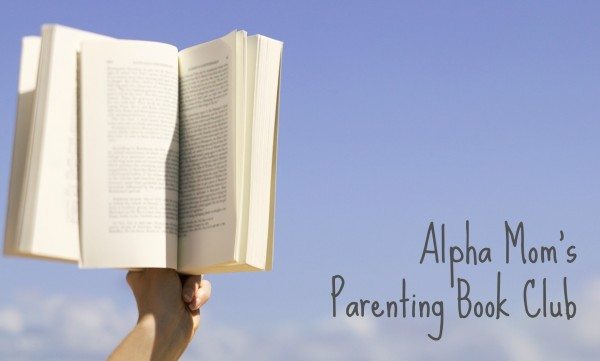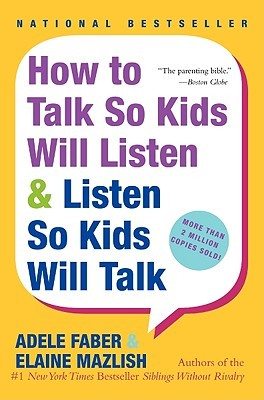
Alpha Mom Book Club: How to Talk So Kids Will Listen & Listen So Kids Will Talk

“There is a wide gap between knowing something intellectually and applying it on the battlefield under fire.” (p.292)
I think this book does exactly that, it gives parents the tools to use on the battlefield.
Having said that, there is no magic formula for parenting kids (wouldn’t THAT be nice!), but I think that this book has helped me realize some areas where I can improve, especially when it comes to the way that I communicate with my children. I feel like this book gave me ideas to make things better. It is easy to get “stuck” in one way of doing something and not be able to see your way out of it, even when you know it isn’t the best way. How many of us have had the horrified realization of hearing our own parents’ voices coming out of our mouths?
Example: one of the things that makes me the most crazy is that my kids, who are teenagers and perfectly capable human beings, will make a mess in the kitchen and not clean it up. Just leave everything out, crumbs everywhere, dirty dishes in the sink, etc.
My ineffectual methods of dealing with it have been:
1) To play the martyr card, “Oh, I guess the slave will just clean up after you! What else does she have to do but cook, do laundry, and clean up after you?” Followed by angrily stomping around the kitchen cleaning up their messes.
2) To be a name caller, “How can you guys be so inconsiderate to make a mess and leave it? Have you all been struck blind? Are you all too lazy to clean up after yourselves?”
3) To ask too nicely, “Hey guys? Can you please do me a favor and clean up the kitchen?” This one usually gets the non-committal, “sure” as an answer and then nothing is done and I become enraged.
4) Sarcasm, “I am confused as to why there is so much stuff left out all over the kitchen. Did it all walk out of the cabinets by itself?”
For the record, I do not recommend any of the above methods. They don’t work.
I am pretty good at the listening part. I do acknowledge my kids feelings and mirror back their emotions to them. So that was the good news.
The bad news? Good God in heaven I am an annoying nag. Who nags, yells, and wears the martyr banner wrapped around me like a comfortable scarf.

In Chapter 2 of the book, I read this passage, “Part of the problem lies in the conflict of needs. The adult need for some semblance of cleanliness, order, courtesy, and routine. The children couldn’t care less.” Yes, that summed my experience up exactly. A big part of me believes that children truly do NOT see the messes that they leave behind in their wake.
“We don’t need to stay calm. We can express ourselves with all the heat we’re feeling, as long as we remember to describe our own feelings and give information, instead of attacking our children.” I have been trying to remember this.
When I came home to a kitchen that looked as if it had been ransacked I said, ” I feel very frustrated when I come home and the kitchen is messy. The food that is left out will spoil. The dirty dishes are on the counters. I am angry right now. I think if you all go into the kitchen and clean it up together it will take less than five minutes. Then we can bring in the groceries from the car and plan dinner.”
It almost seemed too simple. But it worked and has continued in different variations and under different circumstances to work.
The authors also say that as parents we are quick to criticize and slow to praise. That is true. Sometimes it is difficult to get out of the mindset that you don’t need to thank your kids for doing things that they should be doing. But why not thank them?
When I came home a few days later and the kitchen was almost perfectly clean, instead of focusing on the fact that there were crumbs left on the island I decided to look at the positive. “I am so happy. I can tell that all of you really made an effort to clean up after yourselves today. You should all be proud of yourselves for remembering that it was important to me.”
I haven’t come home to a ransacked looking kitchen in a few weeks now. It is amazing to me that a simple shift in my reaction and my choice of words could make that big of a difference.
Here are some other random thoughts I had and jotted down while reading the book.
On Being Disrespectful:
One of my pet peeves is people who are consistently disrespectful to other people. It especially irritates me when children act that way toward their parents. “Where do kids learn how to talk to their parents? At least partly from how their parents talk to them.” That quote from the book certainly speaks to me.
On Punishment:
“By not blaming or punishing, we free the children to focus on taking responsibility, rather than on taking revenge.” This resonated with me. I remember being punished all the time as a kid, for everything. It made me fearful of my parents and angry at them. I felt like I couldn’t admit anything I had ever done wrong because I didn’t want to be punished.
On Dismissing Children’s Feelings:
This book touched on one of my pet peeves, when parents dismiss their child by saying, “Oh he is just looking for attention.” Well, if he is looking for it maybe you should give it to him before it escalates into something that will demand your attention in a not so great way! The book spells this out too. If your child wants attention, give it to them. If they are upset or angry, acknowledge their feelings.
The last pages of the book, written by one of the author’s grown children who has since raised children of her own using the same principles outlined in this book, says “Acknowledging feelings is not the prologue; it’s the main event…It is an ongoing challenge to live life without constantly contradicting the experience of those around us.” I think that about sums up the entire philosophy and why it works.
So now I have been dying to know what everyone thinks about the book. Have you implemented any of the ideas? How have they worked for you? My children are are beyond the unreasonable toddler age (most have moved into the unreasonable teenage years, heh) but I am curious how it has worked for you? I tend to think I was much more patient parent when my children were small and probably used the principles that are in the book more readily. I think maybe I was more willing to accept that toddlers and preschoolers weren’t deliberately doing things to make me mad. But teenagers push a whole different set of buttons.
If you have any questions yourself, please ask them below and we can discuss with one another using the “Reply” button on that comment.
******
Let’s meet back here on Friday, January 4th and talk about NurtureShock: New Thinking About Children! That’s winner of last book poll.
Here are the discussions for our other picks: Far From The Tree, NurtureShock, and Five Love Languages of Children.

